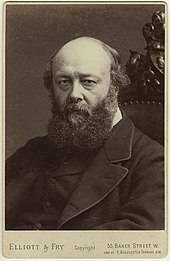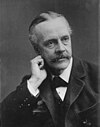Bob's your uncle

"Bob's your uncle" is a phrase commonly used in the United Kingdom and Commonwealth countries that means "and there it is" or "and there you have it" or "It's done". Typically, someone says it to conclude a set of simple instructions or when a result is reached. The meaning is similar to that of the French expression "et voilà!" or the American "easy as pie" or "piece of cake".
Synonyms and variations[]
Expressions of self-satisfaction or pride or delight at the end of a sentence describing an action, a situation, an instruction or direction, especially when it seems easier or quicker than expected:
- The long version Bob's your uncle and Fanny's your aunt meaning "and there you are" or "it's that easy!" or "(after that) it's done!" or "(after that,) you have achieved what you wanted to achieve". One variant is Bob's your uncle and Fanny's your granny. Other variants, of both versions, spell your as yer.
- This longer version may have been shortened to Bob's your uncle as Fanny has taken on a sexual meaning (late 20th century) since the expression was coined (1887).
Expressions with a stronger emphasis on easiness or delight:
- Piece of cake, an informal expression for something very easy.
- It's a doddle, another slang expression for something very easy or it's a cinch.
- Easy peasy, a childish expression for something very easy. Children might also say it's a snap.
Expressions with a stronger emphasis on self satisfaction or pride of achievement or just delight:
- Job done, something said when someone has achieved something, especially when it seems easier or quicker than expected.
- Job's a good'un, similar slang meaning "and there you go" or "it's done with!" or "it's finished with" or "it is completed to everyone's satisfaction".
- Lovely jubbly, made famous by 'Del Boy' the main character from long running English sitcom Only Fools And Horses, lovely jubbly refers to "lovely job" or "great" or "good news" or "It is completed to everyone's satisfaction or profit".
- It's in the bag, meaning "job done" or "and there you go" or "great job!" or "it's all yours!" or "it's completed to your own benefit!"
- Back of the net, literally meaning "goal" or "success!", but used for "great" or "victory at last" or "result!" or "it's completed to your own satisfaction!"
- Zio Bob's your uncle is commonly used amongst the Italian-Australian community in Melbourne with a similar meaning to the original: if you stay calm and slow down you will get it done.
Origin[]

The origins are uncertain, but a common theory is that the expression arose after Conservative Prime Minister Robert Gascoyne-Cecil, 3rd Marquess of Salisbury ("Bob") appointed his nephew Arthur Balfour as Chief Secretary for Ireland in 1887, an act of nepotism, which was apparently both surprising and unpopular. Whatever other qualifications Balfour might have had, "Bob's your uncle" was seen as the conclusive one.[1][2]
The main weakness in this theory is that the first documented usage of "Bob’s Your Uncle" is in the title of a revue at the Victoria Theatre, Dundee, in June 1924. If Salisbury’s notorious nepotism toward Balfour in the 1880s had been so widely spoken of to inspire a popular phrase, it is perhaps unlikely that it would have taken nearly forty years for it to appear in print for the first time.[3]
Cultural references[]
In 1954, the song "Bob's Yer Uncle! (an' Fanny's yer aunt)" was a hit on the British sheet music sales charts, reaching No. 22 on 12 June that year. Composed by Tommie Connor and Eddie Lisbona, the first recording released in Britain was by American singer Guy Mitchell in May 1954. The following month, two covers by British artists were released: one by actor John Slater, and another by Billy Cotton and his Band, with vocals by Alan Breeze and The Bandits.[4] The Mitchell version was not released in his native America.[5]
See also[]
- Garnet Wolseley, 1st Viscount Wolseley, inspiration for "everything's all Sir Garnet"
References[]
| Look up Bob's your uncle in Wiktionary, the free dictionary. |
- ^ Langguth, A. J. (1981). Saki: Life of Hector Hugh Munro. p. 69. ISBN 9780241106785.
- ^ Hendrickson, Robert (2008). The Facts on File Encyclopedia of Word and Phrase Origins. Facts On File. ISBN 9780816069668.
- ^ Quinion, Michael (19 October 2015). "Bob's your uncle". World Wide Words. Retrieved 21 October 2020.
- ^ Henson, Brian (1989). First hits, 1946-1959. Colin Morgan. London: Boxtree. ISBN 1-85283-268-1. OCLC 19389211.
- ^ "U.S.A. 7-INCH 45 RPM SINGLES". 6 February 2005. Archived from the original on 6 February 2005. Retrieved 5 July 2021.
Further reading[]
- Turner-Lord, Jann (1992). Bob's your uncle: a dictionary of slang for British mystery fans. Fithian Press. p. 62. ISBN 9781564740229. 9781564740229.
- British English idioms
- English phrases

